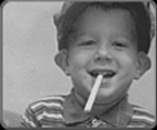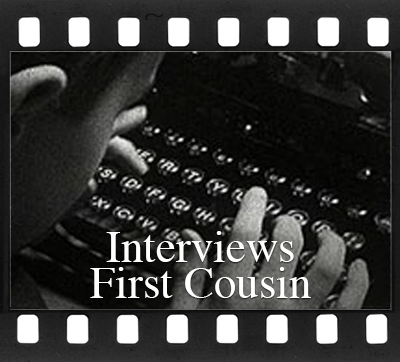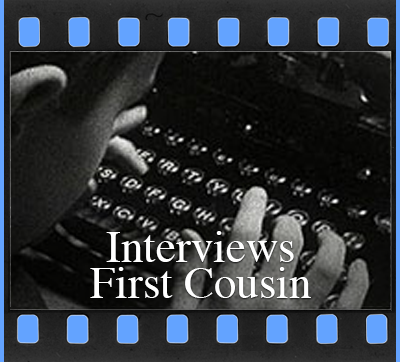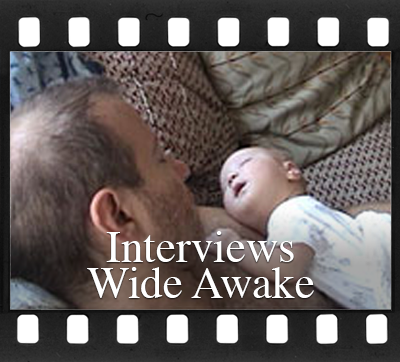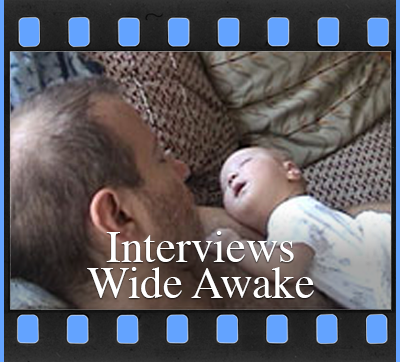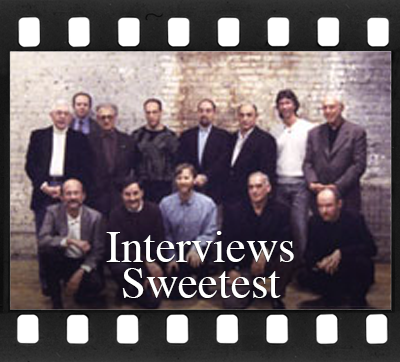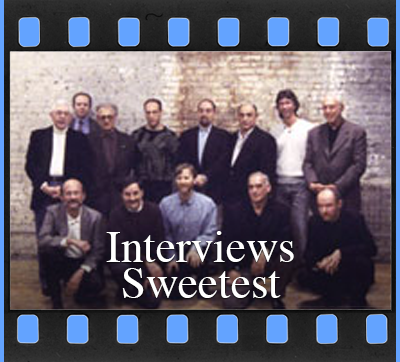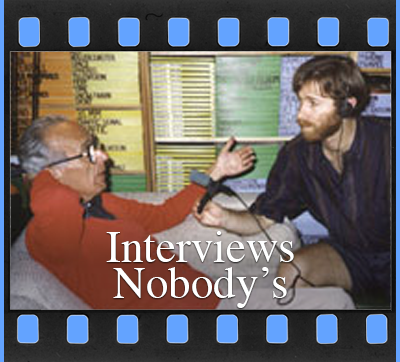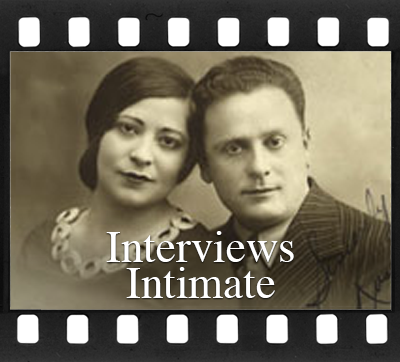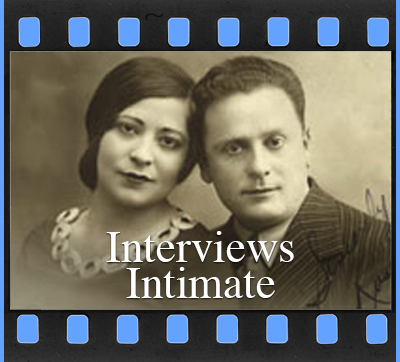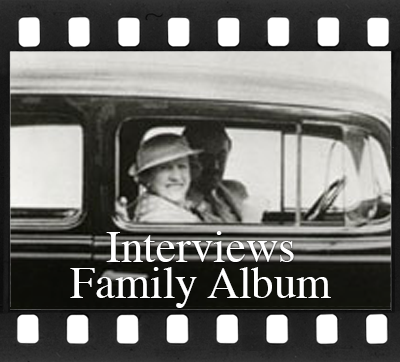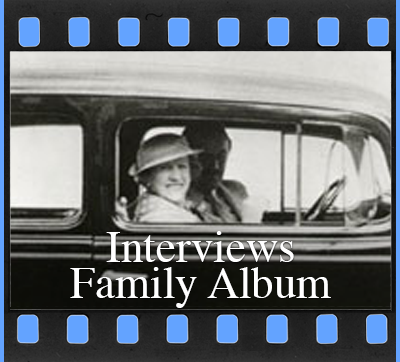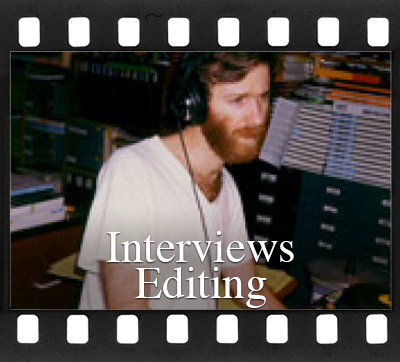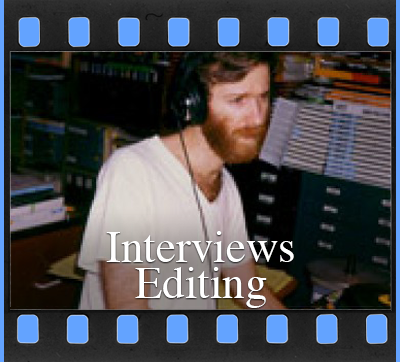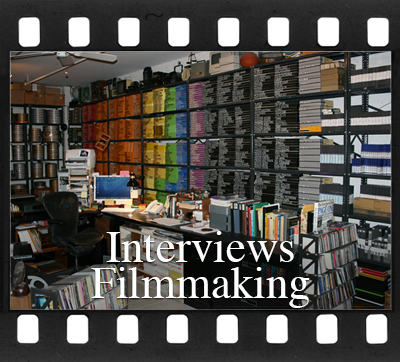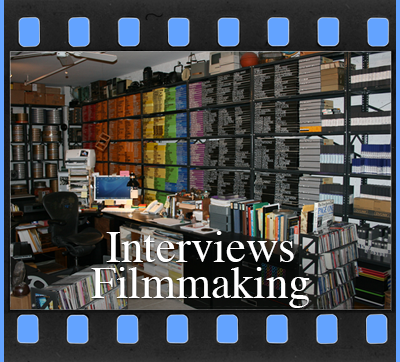THE RELUCTANT WITNESS
Reprinted from The Independent Film & Video Monthly Magazine, 20/4, May 1997 (www.aivf.org) Interview by Mitch Albert
Alan Berliner goes home again to document his father, who says his life is "Nobody's Business."
Alan Berliner has devoted a significant part of his career to the interconnectedness of family, self, and world. Watching The Family Album (1986), viewers may have felt their own histories evoked by the snippets of old, anonymous home movies that Berliner randomly salvaged from estate sales. In Intimate Stranger (1991), Berliner narrows the focus to his own maternal grandfather. With Nobody's Business (1996) he scrutinizes his father, Oscar Berliner, and Oscar returns the gaze, often harshly.
With this latest documentary, the filmmaker says he is personally "raising the stakes." In his previous film, Berliner's subject was a man already deceased, and one whose biography would be of interest to almost anyone. An intense Italian Jew who worked in Egypt and Japan as a cotton trader, he became an unofficial diplomat whose life story is tied in with world events. (To his family, however, he remained a virtual stranger.)
In Nobody's Business, Berliner attempts to get a bead on quite another man, one who's very much alive and is loudly protesting the intrusion. What's more, the son's relationship with the father is fraught with tense personal issues. He wants to unlock not only his father's store of secrets, but also to reclaim his family history through this oldest remaining relative.
Oscar, at 79, is a tough sell. His crinkled, basset-hound features become most animated when contradicting, insulting, insinuating, refusing, negating, or denouncing something in response to his son's ceaseless inquiries. A good part of this obstinacy stems from the reclusive man's sincere belief that a film about his ordinary life is an utterly useless project in addition to being nobody's business. He complies at least somewhat with his son's efforts to document him, as a father indulging a foolish child, but never for a moment buys the premise that every soul is deserving of enumeration, that no life is devoid of significance.
This belief meshes with the worldview of the Mormons, who have assembled the largest genealogical archive in existence. In Nobody's Business, Berliner (who is Jewish) documents his journey to the great vault at Granite Mountain, Utah, where he tries to unearth the family history his father is unwilling or unable to supply. The film integrates this material with family interviews, ironically employed stock footage (classic boxing footage, for example, is used as recurring punctuation when father and son square off), and artifacts from his father's life: photographs, home movies, and footage from his father's daily routine.
The unasked question facing the viewer is: Who's being more unreasonable? The filmmaker, pressuring his father to open up? Or the father, pressuring his son to let the matter drop? Oscar remains unyielding, but Berliner is fully aware that this intransigence makes for dramatic tension and therefore a crackling good film. At the same time, as this man's son he struggles to penetrate his steely negativity and resolve a relationship even as he documents it.
As personal as Nobody's Business is, the film seems to have spoken to quite a few people. This project, funded by the Independent Television Service (ITVS), has received impressive acclaim worldwide, beginning with its premiere at the New York Film Festival last fall. The film went on to win a Golden Spire Golden Gate Award at the San Francisco International Film Festival and a threefold honor at the 1997 Berlin Fest: the FIPRESCI Award from the International Association of Film Critics; the Caligari Film Prize; and the Churches of the Ecumenical Jury Prize. It has also been picked up by Japanese, French, and Australian television networks. And on June 3, Nobody's Business will lead off the 10th anniversary season of P.O.V. on PBS.
MITCH ALBERT: Why was it important to you to make this film?
ALAN BERLINER: So much of my father's life has been a mystery to me. I've always needed to know why he's chosen to live the way he lives: reclusive, pessimistic, cynical about life. Over the years, no matter how hard I tried, I could never change him, could never affect him, or even infect him with my own enthusiasm.
Whether they are alive or dead, our parents send us messages about life; consciously or unconsciously those messages become a part of who we are. The kinds of messages I was getting from my father were becoming very difficult for me to accept.
MA: What were those messages?
AB: That the misfortunes of his life had overtaken him. That he had somehow become a victim of circumstances. My father has so often said to me that he's "in the autumn of his life," "that his future is behind him," that he doesn't have long to live. It's as if he's been in God's waiting room ever since I can remember. In the film I challenge him about his negativity, about the fact that he's alone all the time and doesn't have any friends. These are difficult subjects to talk about, but they have been troubling me for a very long time.
My father is also quite adamant about his own insignificance, taking almost a perverse pride in having lived an ordinary, average, unremarkable life. Once again, unacceptable! Oscar Berliner cannot live for 79 years and tell me his life is nothing, was nothing. I'm much too alive as a human being to accept that attitude from him. So the more he articulated his own ordinariness, the more motivated I became to prove him wrong. To attempt to give his life a new meaning, if not for him, then at least for me.
MA: What was the genesis of this film?
AB: In 1986 I made a film called The Family Album, using 16mm home movies from more than 70 different anonymous American families and a soundtrack composed from oral histories, audio letters, recordings of birthday parties, weddings, holidays, music lessons, etc., most of which were also anonymous. The film dealt with the conflicts and contradictions of family life and the falsely idealized nature of home movies as representations of socialization and the aging process. At the same time, because most of the raw materials I was working with were impersonal, I was left with a gnawing desire to raise the stakes, to make something that derived more from my own life, my own personal relationship to family.
In 1991 I completed Intimate Stranger, a biography of Joseph Cassuto, my maternal grandfather, who died suddenly in 1974, before completing his autobiography. The film, which ultimately became a journey through my maternal family heritage, was only temporarily satisfying. Over time, the emotional distance between dead grandparent and filmmaker/grandson seemed to widen as I began to take measure of what I wanted to do next. Once again I felt an inner urging, a need to again raise the bar, the level of challenge. To go even closer to the edge of personal revelation. In a way I see Nobody's Business as the last in a trilogy of films, moving closer and closer to a kind of human truth, zooming in on the emotional power of family relationships, each one revealing more of me but also demanding more of me. Actually I didn't really have to look very far. My father, who I am happy to say is still very much alive, has always loomed as an incredibly compelling character to me.
MA: Did you ever guess that your father might not want to participate?
AB: Remember, his history is also a part of my history. There are things that only he knows and only he can tell me about both of our lives. He had no idea what kind of film I was going to make and was incredulous of the idea that a film about someone like him could even be made at all. But he respected me and trusted me, and decided that if I was so committed to doing this, he would help me. I suppose, in some way, by agreeing to cooperate, he was once again after all these years helping me with my homework. Maybe that made him feel good, feel needed.
In many respects we became partners in making Nobody's Business. One review refers to the film as a "verbal slapstick duet," as if our conversations were a kind of comedy routine. I think there's a strong element of that, but at the same time we were in absolutely serious emotional territory. He told me when I was out of bounds, when there were things he did not want to discuss, and at several points during the interviews he threatened to take the microphone off and walk away. But he never did.
I think also, that behind this cranky-old-man persona there's still a bit of a vanity in him. Regardless of how insignificant he thinks his life is, at a certain point he's got to be thrilled someone is asking questions about it. It's only human, I suppose.
MA: Have you had that discussion with him?
AB: He denies it, although late in the film, when I'm talking about human genealogy and genetics he interrupts me and says, "What's this got to do with my biography?!" It's as if he really wants the conversation directed back to him.
MA: What topics didn't he want to discuss?
AB: Mostly questions surrounding his marriage to my mother, the reasons for their divorce, and the effects of the divorce on the rest of his life. In general, though, his disinclination to talk reflected his own modest sense of himself. As he says in the film, "I got married, I raised a family, worked hard, had my own business, that's all. That's nothing to make a picture about." The integrity and consistency of his indifference was remarkable to me; that in itself was a kind of exuberance, something I wanted to capture in the film. And mid-way through the film he expresses what I always felt was the key to his participation: "I'm not fooled. In your own tenacious way you're making me talk and talk, and eventually you're getting what you want." It was then that I knew that he had things to say, and somehow, was allowing me to get him to say them.
MA: Did you have in mind to portray him in any specific ways?
AB: No. I never work like that. I always let the subject come to me. I wanted to let him generate the pieces that would form the puzzle, to let him be exactly who he is. I knew that none of the family history issues interested him, but I hoped that our agreement to disagree could form the basis of a quintessential parent/child dialogue. It also made me realize that the film would be as much a portrait of our relationship as it would be a biography of his life. After I tell him, "The more you say you're not interested, the more it makes me want to change your mind," he responds, "You have one bad habit. You think if something's important to you, it's got to be important to somebody else," and warns me that the film will be a flop if I don't heed his advice. That establishes the polemic of the film: my romanticism versus his stoicism.
MA: You perform quite a balancing act: never too much outside nor inside.
AB: There's a part of me that always wanted to protect him, yet I knew that if the film was going to be meaningful, I had to place our relationship outside of the safe harbor of sentimentality and throw us out onto the high seas, where, if you will, fictional characters live. There's no protection out there. For either of us. People project all sorts of things upon you. That's one of the risks of personal filmmaking.
MA: Were there any painful instances about which you had doubts?
AB: In what I consider the emotional core of the film, my father pleads, "When your head hurts you, when you can't walk, when making conversation is a problem...it's not that I choose to be alone, I have to be alone! I can't cope!" Not just his words but the desperate tone of their delivery was profoundly etched in my mind. I was amazed that he was finally articulating his pain, something I'd never really heard before.
On the other hand, there's another point in the film when I ask him about two of his brothers who died in infancy, and he abruptly announces, "I don't want to talk about it!" I can only respond with "Why don't you want to talk about it?" He refuses to even answer that question. Back and forth we go. Finally he threatens to end the interview if I don't change the subject. Our uneasy standoff actually went on for almost four minutes, becoming a kind of meta-argument about the very boundaries of our relationship. Originally, I left about two minutes of it in the film, because it was so extraordinary; father and son in a profound battle of wills.
MA: Why did you cut it down?
AB: My friend Spencer Seidman, who became a story consultant, saw a rough cut and told me this scene made him want to stop watching. That he felt incredibly claustrophobic listening to such protracted raw emotion, what my cousin later describes in the film as a battle between "the irresistible force versus the immovable object." It was also too soon in the film to introduce such an emotional crescendo. So I decided to shorten it substantially. To this day I still don't know about those two dead children who would have been my uncles had they lived or why he wouldn't discuss them. I asked. I persisted. But in the end, I had to drop the subject.
MA: Did you think some people might get turned off by your unrelenting persistence with an unwilling subject?
AB: My parents' divorce felt like an atomic bomb had been dropped on our family. Each one of us was wounded in a different way. My quest to understand, my need to confront my father, is, I believe, an attempt at healing. For both of us. And I think deep down he knows that, too. For better or worse, the relationships we have with our parents are amongst the most intense and powerful we will ever have.
I'd like to think some of our tense exchanges are just another way of expressing love, if only because it breaks down boundaries; boundaries that usually keep us at a distance from one another.
I also believe that regardless of class, nationality, ethnicity, race, or religion, everyone who sees Nobody's Business already has experience in this area. They understand the struggle, the dance of negotiations between me and my father. The fact that we do it in public only deepens its resonance. In the end, whether the viewer is either a parent or someone's child, and that pretty much encompasses everybody, doesn't it? I hope they will be recognize something familiar in our relationship.
MA: How did you negotiate the alternating humor and pain that pervades the film?
AB: Initially my father's protests are funny. Here's a man who refuses even to pretend interest in virtually anything I throw at him, especially anything to do with his own family history. It's humorous also because he's so at ease with his disinterest; he's a natural. At some point though, the levity takes on a darker shading when you realize that his attitude is grounded in his sad predicament; that he is a man who has been wounded by life. To this day I remain especially haunted by an exchange of dialogue in the film: When I told my father that he could have remarried after the divorce (and thereby perhaps have a more comfortable old age), he responds, "Once burned, twice shy." To which I reply, "People say that time heals." His matter of fact response was simply ,"Not always." That resonated with me for a very long time. Still does. Even though I tend to agree with him, although thank God I'm still young enough to hold out some hope, no one had ever said that to me before. And of course, when a parent says it, it takes on an even deeper significance.
MA: That disclosure of private pain boosts our empathy with him.
AB: Yes. Then you understand where all of his resistance comes from, that he's not intending to be funny, which, ironically, frees you up to laugh again. Having articulated his emotional and physical pain, he begins to grow as a character. It provides him with a certain dignity and courage.
MA: Why did you choose the boxing match as a recurring motif?
AB: I wanted the prize fighting scenes to acknowledge the Oedipal drama of our relationship and at the same time place it in a recognizable context as a kind of "verbal sparring." You'll notice that there are no knockouts in the boxing footage, just a lot of punching, scuffling, exchanging jabs. And so it is on the soundtrack. I was careful to include several of my father's verbal put-downs and admonishments of me. For instance, when I ask him about his divorce, he declares that I have "a lack of understanding...a lack of sympathy...a lack of empathy...for what this means" to him. Those words hurt me.
And later, at the end of the film when I tell him that he's never more alert, never more alive than when we have these conversations, and that the film is an expression of love to him, he replies, "Bullshit!" It also hurt me to hear him say that. But again, it's all part of the back-and-forth, punch/counterpunch of our relationship. To continue the metaphor, my father is "the champion." I am very much "the challenger."
MA: How did you devise the scenes depicting a typical day in his life?
AB: For a long period of time, I had asked him repeatedly to share the details of how he spends a typical day. He continually refused. Then suddenly, one day he said yes. Maybe he'd forgotten that he'd said no, maybe he changed his mind. I was dumbstruck at finally getting him to open a window that had been closed to me for so long. I still find it one of the most moving parts of the film and the one that I had the most difficulty editing. He actually went on for 10 minutes, describing the minutiae of shaving, preparing his breakfast, making his bed...He's most vulnerable at that point in the film. I see that section as a meditation on growing old, on loneliness, on the importance of routine when one reaches a certain stage in life, and of my father's struggle with all of it.
MA: Toward the end of the film, you connect Oscar quite ingeniously to the human family he shuns.
AB: My father is always quick to say that he's "one of billions of people." Even when we began talking about his army years, he snapped, "Big deal, there were eleven million men in the army." He likes to hide in these large rhetorical crowds. Now, when you go someplace like the Family History Library in Salt Lake City, as I do in the film, and you're surrounded by the records of more than two billion people who've lived and died over the past 500 years, you begin to realize that people are far more closely related to one another than is generally recognized. In fact, many professional genealogists speculate that most people in the world, of whatever race, nationality, ethnicity, or religion, are no further related than 50th cousin. And that most of us are a lot closer than that! It's an idea that has always fascinated me, and I wanted to use my father as a single, "unremarkable" human being, a face in the crowd, so to speak, as the key that opens the door to thinking about a "human family tree." Of course, he wants no part of it.
MA: When did you map out this strategy of connecting your father's story to the broader genealogical theme?
AB: I didn't have it fully figured out at first. It was a wisp of intuition, of potential. My initial investigations took me to various libraries, archives, museums, Jewish Genealogical Society meetings, even a trip to Poland, all in search of my Berliner family history. My father's heritage. My heritage. Our heritage! Then I'd come home and attempt to share some of my excitement, some of my discoveries, and it was like hitting a stone wall.
My father refuses to be related to anyone he does not or did not know, living or dead, whether they are related to him or not. And he is especially not interested in being related to any of the billions of "ordinary" people, his "50th cousins" with whom he claims to blend in with so well. He's not interested in the social or political implications of a broad human family tree nor will he ever be convinced. He also claims that more people will agree with him than with me.
MA: He refuses relation to everyone except his children and grandchild.
AB: My sister Lynn and I are his main links to the world. Early in the film I show him a picture of his own grandparents, neither of whom he has ever seen before, and he responds by saying, "I don't give a shit about them." But later on in the film, he is seen doting on and playing with his granddaughter, Jade. It's the only time in the film that you see him smile. His explanation for these "expressions of love" is that "you have to be a grandfather to understand...."
MA: But he doesn't see any connection.
AB: No. I remind him that he stands in the same relationship to Jade that his own grandparents once stood to him. He reminds me that he knows Jade, that Jade knows him, but that he never knew his grandparents, that they could be characters taken out of a storybook. Fair enough. But then I tell him that someone far into the future might say the same thing about him one day, might casually shrug off any connection to a photograph of him, to his memory, to his existence. His response? "Big deal. Who cares?" His indifference has a certain power and logic. But at the same time, I got tremendous personal satisfaction trying to learn as much as I could about the lives of my great-grandparents. I'm not implying that I'm right and he's wrong, because I think there's room for both perspectives.
MA: How has your father reacted to seeing the film?
AB: He saw it for the first time at the world premiere at the New York Film Festival, and because of his hearing problem, he had trouble understanding much of the soundtrack. My sense is that it was all very abstract for him, very exciting, and probably very frightening. But he knows that something very special happened that night, especially when 1100 people gave him a standing ovation!
MA: What did making Nobody's Business teach you?
AB: In many ways the film has been profoundly liberating for me. Cathartic. I can honestly say we're much closer now than ever before. It's almost as if the process of making the film has dissipated the tensions between us. I've come to realize that if I can't change him, at least I can try to understand him better. And part of understanding is letting go; letting go means accepting.
MA: How do you think he's been affected by the film?
AB: Perhaps he's had little epiphanies, too. I don't think you can partake in this kind of experience and walk away untouched. Ironically, it took making a film about him to finally show him what it is that I do. He probably still wishes I was an accountant or a lawyer, but at least I've earned his respect. A family friend told me that my father had said the New York Film Festival premiere was "the happiest day of his life." About three weeks after the screening, I went to his apartment and noticed that he had framed the postcard announcement for the film and put it on his bookshelf. He's never done anything like that before! My sister Lynn remarked that if there's such a thing as a personal growth meter, then that gesture certainly went way off the scale.
MA: It certainly seems significant.
AB: He knows that we shared a journey. That it took mutual courage to undertake this project. He understands that all the questions I asked about his life, even the troubling ones, were all part of something truly authentic and important. For both of us. Throughout the process of making the film, during both shooting and editing, there was always the danger that I might lose my relationship with my father, that things could fly out of control at any time. That fear somehow gave me energy, became the fuel that made Nobody's Business the most intense project I've ever attempted.
Fortunately, we can now look back and smile. He sees the reviews of the film, he watches as I go off to film festivals to show it. He's aware that it's going to be broadcast on public television in June. It's both shocking and amusing to him. And as a parent, as a father, I detect him taking a vicarious pride in the film, as if we've both done well on our homework assignment. But at the same time I can't fool myself. I'm still quite sure that he's never going to ask to see those photographs of his grandparents again.
Mitch Albert is a shapeshifter who morphs from documentarian to journalist to screenwriter to student of Oriental medicine and the Alexander Technique and back again, all in London, England.
